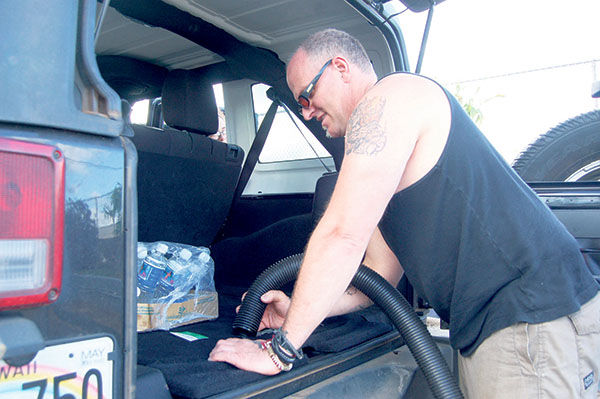LIHUE — With miles of roads needing to be repaved or repaired, County of Kauai officials say it could cost tens of millions of dollars to address them all. But to help offset the estimated $100 million needed to pay
LIHUE — With miles of roads needing to be repaved or repaired, County of Kauai officials say it could cost tens of millions of dollars to address them all.
But to help offset the estimated $100 million needed to pay for these road repairs and funding other initiatives such as The Kauai Bus, Mayor Bernard Carvalho Jr. and his administration are asking the Kauai County Council to approve gradual increases to the county’s motor vehicle weight tax.
Those rates are now set at $0.02 per pound for passenger vehicles and $0.03 per pound for freight vehicles.
“There’s $100 million in unpaved road needs based on our most recent assessments, and if we go at that every two years with $2.4 million, it’s going to be a long haul,” County Purchasing Director Ernie Barreira said.
Though just under $1.4 of the $13.5 million in revenues generated by vehicle weight taxes, utility franchise taxes and fuel taxes were used during the last fiscal year to fund road signs and markings as well as maintain street lights, taxpayer money was also used to subsidize The Kauai Bus as well as pay the salaries and benefits of county road crews.
County Finance Director Ken Shimonishi said about $3 million in revenues from those three taxes were used to subsidize The Kauai Bus services for the current fiscal year. That same subsidy totaled a little less than $2 million during the 2013-2014 fiscal year, according to county budget documents.
About $2.7 million in revenues was also used during the 2013-2014 fiscal year to support operations at the Hanapepe, Kapaa and Hanalei baseyard for county road maintenance crews and pay their salaries and benefits.
Kalaheo resident Cat Pimental said she would rather not pay more but acknowledged the need to maintain and fix the island’s county-owned roadways. She worries, however, about the costs passed down to some families with multiple vehicles.
“You know how it is just to buy bread and milk, but then again, paying taxes is a part of life,” Pimental said. “If you want improvements, the money for it has to come from somewhere.”
The proposal now on the table calls for a $0.005 increase for all passenger vehicles beginning on Jan. 1, 2016, bringing the rate for those vehicles to $0.025 per pound.
Doing so would increase the amount that residents pay for an average 2,979-pound compact car from $59.58 to $74.48. Owners of midsize trucks, weighing in at 4,259 pounds on average, would see their annual tax payments jump from $85.18 to $106.48.
“If you drive a vehicle and place those stressors on the road, you contribute equally to the fund and the return investment is that the roads are attended to,” Barreira said.
Those taxes, under the proposal, would increase again by $0.005 per pound for passenger and freight vehicles beginning on Jan. 1, 2017. This would bring the rates for passenger vehicles to $0.03 per pound and rates for freight vehicles to $0.035 per pound.
An average 2,979-pound compact car, in turn, would cost $89.37 annually, while an average 4,259-pound midsize truck would cost $127.77 annually.
“If you think about it, it might actually be cheaper to go ahead and pay that extra one cent per pound because you’ll probably spend less time and money on your tires,” Pimental said.
The state’s vehicle weight tax, which is used to benefit state-owned roadways like Kuhio and Kaumualii Highways, was last raised by the state in October 2011.
Those taxes, which are paid on top of the county’s version, are set as: vehicles up to 4,000 pounds are $0.0175 cents per pound; vehicles 4,001 pounds to 7,000 pounds are $0.02 per pound; vehicles 7,001 pounds to 10,000 pounds are $0.0225 cents per pound; and vehicles over 10,001 pounds are a flat rate of $300.
Councilwoman JoAnn Yukimura said she is waiting for county officials to outline their plans on how they will spend the estimated $3 million in additional revenue generated by the proposed tax increases over the next two years, but pointed out that not funding and delaying road work won’t solve the problem.
“We need revenues to do that, but if we put it off any longer, the cost will just continue to go up,” Yukimura said. “If it’s not a cost to the county, it will be a cost to the drivers for repairs on their cars. It’s almost like we don’t have a choice — have to fix our roads, if we want to keep traveling and get from place to place on this island.”
Others on the seven-member board, however, see things differently.
“Local residents are tired of paying more and more in taxes and fees every year,” Councilman Gary Hooser said. “I will not be supporting this increase.”
The Kauai County Council approved last year an increase to the motor vehicle weight tax from $0.0125 to $0.02 for passenger vehicles — the first tax hike of its kind since May 1999. A little less than $4.5 million was collected for the 2013-2014 fiscal year.
The proposed increase will go to first reading at 8: 25 a.m. at the Historic County Building. It needs to pass three readings before it can go into effect.


